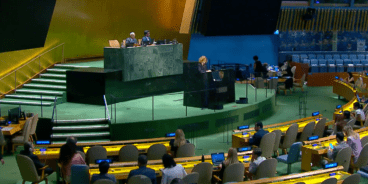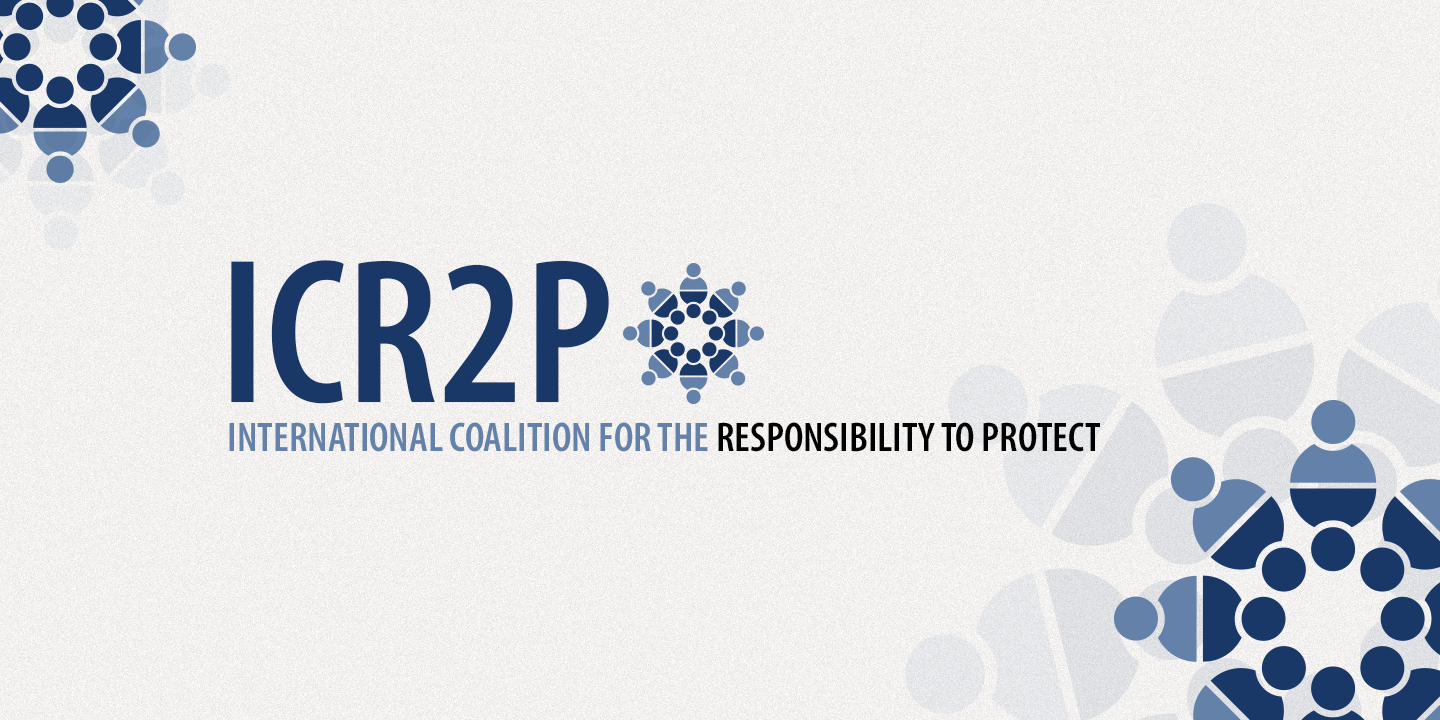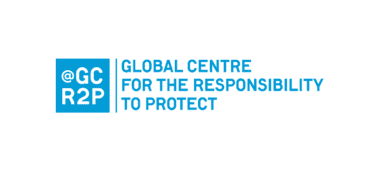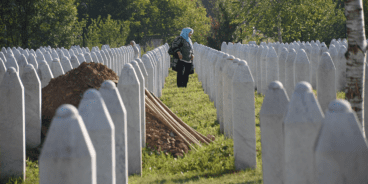

Call to Action for the United Nations General Assembly during its 78th session from the International Coalition for the Responsibility to Protect
As UN member states proceed through the 78th session of the UN General Assembly, member states will have an opportunity to renew and deepen their collective commitment to upholding the key pillars of the UN – human rights, peace and security, the rule of law and development – as well as to set an ambitious agenda to protect populations through effective multilateralism.
Moreover, in the 2005 World Summit Outcome Document, states committed to a collective responsibility to protect populations from mass atrocities, namely genocide, war crimes, crimes against humanity and ethnic cleansing. In this regard, the International Coalition for the Responsibility to Protect (ICR2P) calls on all UN member states to fulfill the following commitments during the 78th session.
1. INTEGRATE ATROCITY PREVENTION PRIORITIES IN THE IMPLEMENTATION OF THE NEW AGENDA FOR PEACE
The Secretary-General’s recently published New Agenda for Peace presents a vision and a unique opportunity for the UN to enhance its toolbox to prevent outbreaks or escalations of hostilities and to ensure that approaches to prevention, response and resolution do not remain siloed. ICR2P calls on UN member states to integrate atrocity prevention priorities as they take individual and collective steps to implement the principles and recommendations laid out in the New Agenda for Peace. Specifically, ICR2P calls on UN member states to expand thinking beyond existing conflict prevention frameworks and include a focus on specific risks associated with atrocity crimes.
The New Agenda for Peace emphasizes the eradication of violence in all its forms. In this regard, early warning should be rooted in accurately identifying all factors that pose a threat to populations, including the risk factors associated with atrocity crimes and cycles of impunity for atrocity crimes. Efforts to strengthen international foresight and prevention would benefit from assessing situations through an atrocity prevention lens.
Atrocity crimes have a range of distinct and unique warning signs. Societal structures and patterns of behavior that may precede violations and abuses of human rights, identity-based violence and targeting or mass atrocities may be missed in assessments that are strictly focused on conflict prevention or human rights promotion. By helping to contextualize the drivers of human rights violations, an atrocity prevention lens enables a broader understanding of how root causes and other exacerbating factors give rise to abuses against populations. ICR2P calls on UN member states to strengthen their individual and collective early warning and preventive capacities by integrating an atrocity prevention lens into all peace, security and human rights work at the General Assembly and ensuring human rights violations and abuses are effectively addressed in specific country situations. UN member states should also ensure that analytical frameworks reflect the diversity of populations around the world and the intersectional nature of unique risks they face.
Practically, UN member states can fulfill this by:
-
-
- Requesting the UN Office on Genocide Prevention and the Responsibility to Protect to include country assessments in the Secretary-General’s annual R2P report, in line with requests made by 61 states at the General Assembly plenary meeting on the “Responsibility to Protect and the prevention of genocide, war crimes, ethnic cleansing and crimes against humanity” held in June 2022;
- Ensuring information collected and presented before the Human Rights Council (HRC), Security Council (UNSC) and General Assembly, as well as its various committees, includes an assessment of specific atrocity risks and how best to address them;
- Leveraging meetings under Resolution 76/262, which mandates a meeting of the General Assembly whenever a veto is cast in the UNSC, to ensure member states are effectively responding to atrocity situations and upholding their responsibility to protect;
- Regularly raising risks of atrocity crimes in country situations when participating in relevant bodies, including the Third Committee, segments during the Economic and Social Council, the Peacebuilding Commission and elsewhere;
- Highlighting risk factors and indicators in the UN Framework of Analysis for Atrocity Crimes when discussing country situations;
- Replicating multilateral commitments to upholding R2P at the national level by integrating atrocity prevention concerns in national strategies, mechanisms or policies as recommended by the UN Secretary General in his 2017 annual report “Implementing the Responsibility to Protect;”
- Becoming a member of the Group of Friends of R2P and the Global Network of R2P Focal Points.
-
2. FACILITATE AND ENSURE MEANINGFUL PARTICIPATION OF CIVIL SOCIETY AND AFFECTED POPULATIONS, INCLUDING SURVIVOR COMMUNITIES
The participation of civil society and affected populations, including survivor communities, is critical to the prevention of and response to atrocity situations. Such groups are equipped with an in-depth understanding and expertise that UN member states should incorporate and centralize in development and all atrocity prevention efforts.
Civil society actors and affected communities are often the first to witness and document the indicators and early warning signs of atrocities – they are also often the people defusing tensions among their communities, even amidst escalating violence. The firsthand lived experience and knowledge of affected populations, including survivor communities, are critical to an informed understanding of possible outcomes. When violence does escalate, communities themselves are often the first to lead and implement unarmed protection strategies that save lives. Communities, survivors and civil society also play a critical role in the aftermath of atrocity crimes, often driving advocacy for justice, accountability and redress, and peacebuilding and reconciliation initiatives. The economic and social devastation inflicted by atrocity crimes most severely impacts civil society and affected populations. Civil society actors and affected communities are therefore best placed to understand the strategies required for long-term sustainable growth, including the most appropriate development measures that can facilitate structural prevention.
ICR2P calls on all UN member states to individually and collectively center and embed the lived experience, knowledge and rights of civil society and affected populations throughout all stages of decision-making processes, particularly in crafting development priorities, as well as technical assistance and capacity building efforts. UN member states can do so by holding regular consultations and briefings with civil society and affected communities – including Indigenous Peoples and LGBTQIA+ communities facing atrocity risks – as well as systematically seeking their insight and input with conscious effort to avoid re-traumatization and tokenization of affected communities.
Member states should also ensure that civil society access to UN spaces, including the General Assembly, is safeguarded and feasible, including by alleviating administrative burdens on organizations with limited resources and regularly funding any interpretation or translation services to overcome language barriers In so doing, the international community can take more appropriate, inclusive and effective preventive action that is rights-based and community-informed, in line with the foundational step of “people-centred approaches” as outlined in the New Agenda for Peace.
3. HIGHLIGHT AND PRESERVE THE IMPORTANCE OF HUMAN RIGHTS, JUSTICE AND ACCOUNTABILITY WITHIN THE UN SYSTEM
Blatant violations of international humanitarian and human rights law are key drivers of protracted conflicts and atrocities. They have become a regular feature of armed conflicts and are commonly used as a deliberate strategy to intentionally target civilians and civilian objects. This trend is proliferating because of the international community’s inability or unwillingness to hold perpetrators accountable and deter continued violations. ICR2P strongly believes that in order for the New Agenda for Peace to be effective, persistent impunity and the growing disregard for the rule of law must be addressed. Not only does ending impunity through criminal investigations and transitional justice processes help deter future crimes, but recognition of the suffering of victims and survivors and pursuing accountability for violations and abuses perpetrated against them can have immense restorative value. ICR2P calls on UN member states to consistently prioritize the pursuit of transitional justice, including accountability, in the aftermath of conflict and atrocities as key avenues for deterrence and in preventing recurrence.
The international human rights architecture is increasingly under attack, especially within the UN system. Alarmingly, funding and resources for human rights mechanisms and bodies mandated by the HRC and General Assembly are regularly challenged in the General Assembly’s Fifth Committee, including for human rights and protection activities within the UN system, the Office of the UN High Commissioner for Human Rights and key functions in peacekeeping including gender or child rights experts and specialized protection officers and human rights monitors. Certain member states also attempt to entirely defund critical human rights and/or accountability mandates.
ICR2P calls on UN member states to make every effort to fully fund human rights and protection mandates in the Fifth Committee, with a view to integrating human rights funding into the regular UN budget in order to guarantee predictable funding streams for vital human rights and protection mandates. ICR2P also calls on UN member states to earmark funding where applicable for atrocity prevention, as well as provide the Office on Genocide Prevention and the Responsibility to Protect with sufficient resources to carry out its mandate.
ICR2P highlights the importance of ongoing negotiations for a new crimes against humanity convention that would help to advance protection for populations at risk. UN member states should adopt a gender-competent, survivor-centered and intersectional lens in considering the Draft Articles on Prevention and Punishment of Crimes Against Humanity and in the development of a new crimes against humanity treaty. ICR2P further highlights the importance of Article IX of the Convention on the Prevention and Punishment of the Crime of Genocide, which provides for jurisdiction of the International Court of Justice for disputes between Parties. Article IX provides an important process to facilitate adherence to the Genocide Convention, respond to serious violations of the Convention and ensure accountability of States. ICR2P calls on all states that have attached reservations to Article IX in their ratifications of the Convention to relinquish these reservations.
4. REINFORCE AND STRIVE FOR A COHESIVE AND EFFECTIVE UN SYSTEM
A cohesive and effective UN system is crucial to helping the international community uphold their collective responsibility to protect. It is also critical to upholding the UN Charter and ensuring that multilateralism delivers peace, dignity and equality for all people as articulated in the New Agenda for Peace. ICR2P calls on UN member states to hold one another and the international community accountable for their obligations under international law, including the UN Charter.
The UN system’s current siloed approach to issues of human rights, peace and security and atrocity prevention often inhibits crucial information and early warning to be shared with all relevant UN departments and bodies, including the UNSC and General Assembly. Effective prevention of atrocities can only be achieved if the UN system responds holistically by using all the tools and mechanisms at its disposal and ensuring that all relevant information and capacities are shared and acted upon. This includes utilizing tools for the protection of human rights to inform discussions of international peace and security and better operationalizing tools for the maintenance of peace and security in the protection of human rights. Similarly, greater cross-departmental collaboration, including partnerships between the UN Office on Genocide Prevention and the Responsibility to Protect and other UN bodies, will contribute to enhancing the UN’s collective capacity to prevent atrocity crimes or halt their occurrence.
ICR2P hopes that this call will translate into genuine concerted efforts to protect populations from mass atrocity crimes, hold perpetrators accountable and prevent atrocity risks from escalating. ICR2P and its member organizations stand ready as resources of support, early warning and expertise for member states in fulfilling this responsibility.

